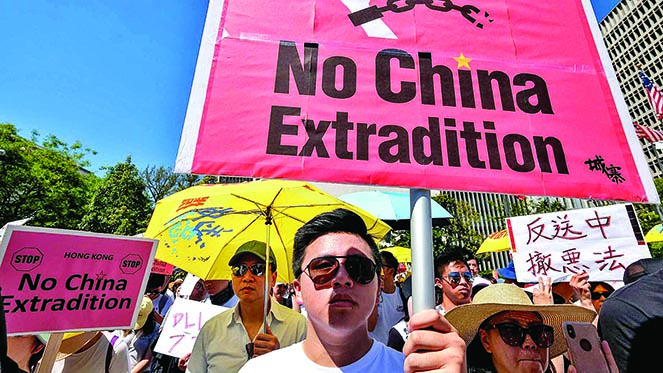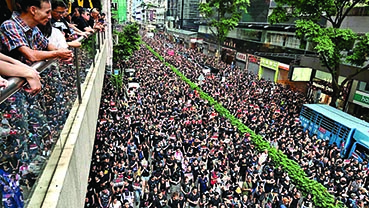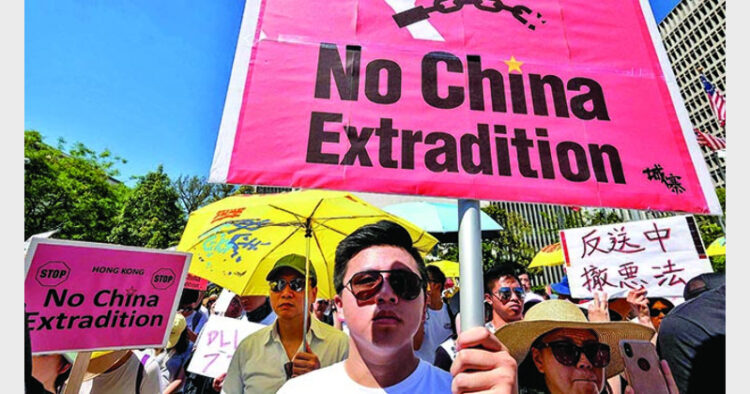The proposed extradition law would allow suspects to be sent to mainland China to face trial. Millions have thronged the streets to protest against the proposed law allowing the extradition of individuals to mainland China
TS Chandrashekar
As Hong Kong burned and fought for its rights this week, it remembered Tiananmen Square where innocent people who were peacefully demanding their basic democratic rights were crushed with tankers, bullets, riot police and Chinese Army took away their lives. Now in a repeat of Tiananmen Square incident, China has been challenged and people are demanding to safeguard their rights.

Man protesting in Hong Kong holding up a sign saying ‘No China Extradition’
Hong Kong was handed over to Communist China on July 1, 1997, by the United Kingdom. Since then, Hong Kong became a special administrative region and continues to maintain governing and economic systems separate from those of mainland China. Hong Kong maintained an administration modelled after the Westminster system. It was a democratic state and the Chinese promised not to disturb the status quo for 50 Years. But that status quo has been challenged by the New Extradition Treaty imposed by China.
Root Cause – Proposed Extradition Law
The proposed extradition law would allow suspects to be sent to mainland China to face trial. Millions have thronged the streets to protest against the proposed law allowing the extradition of individuals to mainland China, where the Communist party controls courts. Also, if approved, the law would allow the extradition of people not only to China but to any jurisdiction in the world with which Hong Kong has no existing formal agreement.

Thousands rally against extradition, prompting apology from Hong Kong leadership
Opponents of the bill questioned the fairness and transparency of the Chinese court system and worry about Chinese security forces contriving charges. Critics fear the law would allow Beijing to seize anyone it likes and whoever sets foot in the territory. This could mean that from a normal resident to the chief executive of a multinational could be apprehended even if in transit and whisk him off to mainland China on trumped-up charges. This is also the fear of the business community, which is already doing business in Hong Kong.
Opposition parties argue that the chief executive would feel compelled to support an extradition request from China because a Beijing-dominated election committee selects he or she. They also point to the Basic Law, Hong Kong’s mini-constitution, under which the chief executive is deemed “accountable” to Beijing. The Hong Kong Bar Association argues that the courts would have only a “limited role in reviewing and rejecting the extradition process” and has raised concerns that the bill allows insufficient procedures to protect human rights.
Entire Hong Kong Joins Protests
The 2019 Hong Kong anti-extradition bill was challenged by all sections of the society including school children, university students, Lawyers, Doctors, Businessmen, Agriculturists, Fisherman and every other strata of the society. The movement gained momentum when the April 28 demonstrations attracted an estimated 130,000 protesters.
After the chaos in the Legislative Council meetings and the curtailment of the usual procedure of scrutinising the bill, as well as the concerns raised by foreign business groups, politicians and governments in May, the June 9 protests calling for the withdrawal of the bill and resignation of Chief Executive Carrie Lam was attended by over a million people. Protests were also held in cities such as New York City, San Francisco, Los Angeles, Toronto, Vancouver, London, Paris, Berlin, Frankfurt, Tokyo, Sydney and Taipei.
On June 12, the day the government attempted to table the bill for second reading, the protest outside the government headquarters descended into violent clashes, where the police fired tear gas, beanbag rounds and rubber bullets indiscriminately at largely peaceful protesters and declared it as a “riot”. The government’s action sparked controversy over the use of excessive force and police.
On June 16, according to claims by the organizers of the protest, a historical record of nearly two million people turned out in demonstration against the extradition bill as well as the police brutality. A day later, Chief Executive Carrie Lam announced a pause in the passage of the extradition bill. The demonstrations forced the government to suspend the bill and Carrie Lam apologized for the crisis that had engulfed the city. However, the protesters further demanded that the government fully withdraw the bill, release all those arrested in previous protests and launch an investigation into the police’s use of excessive force on June 12.
On July 1, tensions again erupted on the anniversary of Hong Kong’s 1997 return to Chinese rule, as hundreds of angry protesters stormed the Hong Kong’s legislature. Police fired teargas to disperse them. Demonstrators damaged the legislative council building during the massive protests.
China on the Backfoot
British Foreign Secretary Jeremy Hunt said, “We signed an agreement ensuring ‘One Nation, Two Systems’ for 50 years, so I hope there are no changes which undermine that legally binding agreement.” China in 1997 had given guarantees of autonomy and various freedoms including a separate legal system, which many diplomats and business leaders believe is the city’s strongest remaining asset. Many Hong Kong young protesters were saying that “the storming of parliament was a symbolic act of defiance against a government and political system they had little say in. Hong Kong’s leader is not elected by ordinary voters but by a committee accountable to Beijing. Only half of the 70-seat legislature is directly elected, while the other 35 seats are occupied by mostly pro-establishment figures from corporate and special interest groups. Young people also said it was a sense of hopelessness that had driven them to desperation, as the government continued to fail to respond to their political demands.”
Foreign political and diplomatic pressure over human rights, as well as recent statements from U.S. Secretary of State Mike Pompeo and his British and German counterparts, have but China and Hong Kong’s administration on the backfoot. Some 11 European Union envoys met Hong Kong Chief Executive Carrie Lam to protest formally. For now, the bill is idle and Hong Kong is in check by democracy. Now, the real warning goes to mainland Communist China, which was the guide behind the law which democratic Hong Kong protested. The protests have given China a lesson to reckon with before its people demand democratic rights against one-party rule, human rights and more.
(The writer is a Political Analyst, Columnist, International Affairs and Korea Expert)














Comments